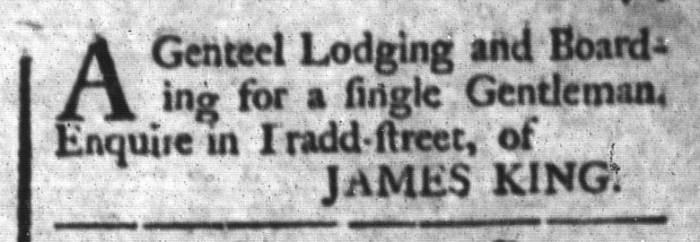GUEST CURATOR: Jonathan Bisceglia
What was advertised in a colonial American newspaper 250 years ago this week?
 South-Carolina and American General Gazette (April 17, 1767).
South-Carolina and American General Gazette (April 17, 1767).
“A Genteel Lodging and Boarding for a single Gentleman, Enquire in Tradd-street, of JAMES KING.”
This is the entire advertisement from the South-Carolina and American General Gazette. However, this is why I picked it. Although only fourteen words, this advertisement poses a lot of questions, the most important being the usage of the word “genteel.” What did “genteel” mean in eighteenth-century America?
The Oxford English Dictionary states that genteel means “Belonging to or included among the gentry; of a rank above the commonalty.” Other definitions similarly state “Appropriate to persons of quality,” “characteristic of persons of quality,” and “suited to the station of a gentleman or gentlewoman.” When describing dwellings, food, meals, and hospitality – like the “Lodging and Boarding” in this advertisement – “genteel” means “Stylish, fashionably elegant or sumptuous.” This is important because it suggests that King advertised to someone who was looking for accommodations appropriate for his social ranking or perhaps even hoping to move up in status.
“Genteel” also referred to how people acted in addition to describing consumer goods and “Lodging and Boarding.” The Oxford English Dictionary also includes these definitions: “Having the habits characteristic of superior station” and “Of behavior: courteous, polite, obliging.” According to Cathy Hellier at Colonial Williamsburg, “Not only how something was said, but when it was said, were reflective of the social positions of the speakers.” This advertisement, regardless of its short length, shows the importance placed on social status in colonial and Revolutionary America.
**********
ADDITIONAL COMMENTARY: Carl Robert Keyes
Inviting undergraduates to serve as guest curators for the Adverts 250 Project opens up a variety of opportunities, not only for the students but also for me as an instructor and a scholar. Through their own efforts on the project, students often convince me to look at familiar material in new ways.
Take today’s featured advertisement. When Jonathan submitted it to me for consideration I told him that I would approve it because it fit within the parameters of the project and adhered to its methodology, but I also suggested that it seemed a bit sparse, especially compared to many of the more substantial advertisements that appeared in the same issue of the South-Carolina and American General Gazette. Although I approved King’s advertisement for “Lodging and Boarding,” I recommended that Jonathan consider alternatives and let him know that he could switch to another advertisement if he experienced too much difficulty examining this one. Jonathan assured me that he would find something interesting and significant to say about King’s advertisement. I was both curious and anxious when he began independently pursuing his research and writing the first draft of today’s entry. I had no idea how he might approach what appeared to be such a simple advertisement.
I was pleasantly surprised when Jonathan submitted his initial analysis of the advertisement. In focusing on a single word, “genteel,” he opened a portal to investigating eighteenth-century understandings of status, personal comportment, and social mobility. He originally relied solely on Cathy Hellier’s article, but I suggested that if he really wanted to understand the meaning of “genteel” in the eighteenth century that he also needed to incorporate the OED’s treatment of the word. This was a new source for Jonathan, at least as far as conducting historical research was concerned. In the following draft, he included one of the entries from the OED. Working together, we fleshed out his revised entry and better harnessed the OED’s extensive treatment of “genteel” to introduce readers to the many shades of meaning associated with the word in early America.
This was a learning experience for me as much as it was for Jonathan. I spend so much time examining eighteenth-century sources that the word “genteel” did not even register with me when I initially reviewed today’s advertisement. As a student interested but not immersed in early American history, on the other hand, Jonathan did not take “genteel” for granted. By training different eyes on the same advertisement, he raised important questions about an advertisement that turned out not to be as simple as I initially thought. In so doing, he implicitly made an argument that I regularly advance: advertisements that appear to be little more than notices often turn out to have layers of meaning and significance when examined more closely.
Share this:




